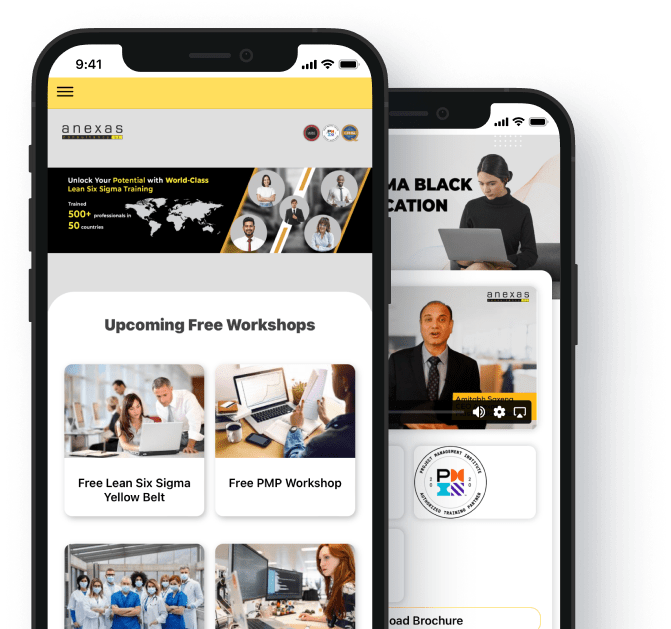Table of Contents
Share This Article
CPHQ Exam Breakdown: Key Topics You Need to Master
- 29816 views
Introduction
The Certified Professional in Healthcare Quality (CPHQ) certification is a prestigious credential awarded to healthcare professionals who demonstrate their expertise in quality management and patient safety within healthcare settings. Earning the CPHQ certification not only boosts your career prospects but also proves your commitment to improving healthcare quality through well-established practices and standards. For those seeking to advance their careers in healthcare quality, the CPHQ exam is a key stepping stone. It serves as a comprehensive assessment of a professional’s ability to lead quality initiatives, manage healthcare data, and enhance patient safety.
The CPHQ exam plays a crucial role in advancing healthcare quality careers by providing professionals with the necessary recognition and skills to excel in a competitive field. It signifies a mastery of critical areas that are essential to ensuring effective healthcare systems and patient outcomes. For anyone considering this certification, understanding the CPHQ exam key topics is vital to developing an effective study plan and ultimately passing the exam.
In order to succeed, a solid understanding of the CPHQ exam structure and its purpose is required. The exam is divided into several important areas, each targeting core competencies in healthcare quality management. This CPHQ exam breakdown for beginners will help individuals better understand which areas to focus on and how to approach their studies. Knowing the exam’s structure allows candidates to allocate time effectively and prioritize their learning, making it easier to develop a CPHQ exam study plan.
Mastering CPHQ exam topics requires careful preparation. A CPHQ exam study guide is an invaluable resource, as it provides an outline of all the CPHQ exam essential areas you need to master. These include healthcare quality management, data analytics, patient safety, compliance, and strategic planning—each an integral part of the exam and healthcare quality practices. Candidates should pay special attention to the important CPHQ exam topics to focus on, including health data measurement, quality improvement methods, and regulatory standards. Familiarizing yourself with the CPHQ exam content outline ensures that no topic is left out and that you are prepared for all possible questions.
Knowing what to study for CPHQ certification is key to minimizing time spent on irrelevant material. You should concentrate your efforts on CPHQ exam practice questions that simulate the actual test environment, as they are excellent for reinforcing your knowledge and refining your approach. CPHQ exam preparation tips emphasize active study techniques, such as using flashcards, engaging in study groups, and revisiting any weak points identified during practice sessions.
Ultimately, understanding the CPHQ exam overview is crucial to preparing effectively. By familiarizing yourself with the CPHQ exam topics list, you will have a clear roadmap for your studies. Tailoring your CPHQ exam strategy for success around these key topics, along with a disciplined study schedule, will improve your chances of success. Whether you are just starting or looking to refine your knowledge, understanding these foundational principles is essential for your journey toward becoming a CPHQ professional.

Understanding the CPHQ Exam
The Certified Professional in Healthcare Quality (CPHQ) exam is an essential certification for professionals in the healthcare quality management field. Understanding the CPHQ exam requirements is the first step in preparing for this challenging and rewarding exam. To become CPHQ-certified, candidates must meet specific eligibility criteria, including a certain level of professional experience in healthcare quality management. Additionally, they must pass the exam, which is designed to assess their expertise in key areas of healthcare quality, patient safety, and performance improvement.
The CPHQ exam format consists of multiple-choice questions, offering a thorough test of a candidate’s knowledge across several domains. The exam typically includes 125 questions, which are designed to cover a wide range of CPHQ exam key topics related to healthcare quality. Candidates are given a specific time limit, generally 2.5 hours, to complete the exam. This format tests both breadth and depth of knowledge, requiring candidates to apply their understanding to practical, real-world situations. For anyone new to the exam, understanding the CPHQ exam breakdown for beginners will provide clarity on how to allocate time and efforts effectively.
To succeed, candidates need to familiarize themselves with the CPHQ exam scoring and passing criteria. The exam is scored on a scale, and the passing score varies based on the difficulty of the questions answered. It’s important to note that this is not a traditional pass/fail test—rather, your score reflects your competency in the various CPHQ exam essential areas. Candidates should focus on mastering all key areas listed in the CPHQ exam content outline, as the exam evaluates both your theoretical knowledge and practical application of quality management techniques.
The CPHQ exam aligns closely with healthcare quality standards, including guidelines established by organizations such as The Joint Commission (TJC), the National Committee for Quality Assurance (NCQA), and the Centers for Medicare & Medicaid Services (CMS). These standards are integrated into the exam, ensuring that certified professionals are equipped to handle quality improvement initiatives in accordance with industry best practices. This alignment with healthcare quality standards means that passing the CPHQ exam signifies a deep understanding of the frameworks and methodologies that drive quality care and patient safety.
Earning the CPHQ certification brings several benefits to healthcare professionals. It boosts credibility in the healthcare industry and enhances career prospects by demonstrating expertise in quality management. The certification is recognized across healthcare organizations, providing professionals with the opportunity to contribute to improving patient care, safety, and operational efficiency. For those considering the CPHQ exam preparation, having a solid CPHQ exam study plan is crucial. A well-organized study schedule that focuses on the important CPHQ exam topics to focus on—such as quality improvement, patient safety, and healthcare data analysis—will significantly increase the chances of success.
Mastering the CPHQ exam topics list requires targeted study and practice. Utilizing resources like a CPHQ exam study guide can help break down complex topics and provide structured approaches to mastering the CPHQ exam key topics. Regularly reviewing CPHQ exam practice questions allows candidates to simulate the test environment, helping them refine their CPHQ exam strategy for success. By understanding the structure and requirements of the CPHQ exam, professionals can enhance their knowledge, feel confident on exam day, and achieve their certification with the right preparation.
Key Topic Areas to Master
The CPHQ exam covers several key topic areas that are essential for anyone aiming to become proficient in healthcare quality management. Understanding these areas is critical for success and to ensure that your study plan is comprehensive and targeted. Below, we delve into the major areas of focus for the CPHQ exam, which are central to achieving a passing score and demonstrating your mastery of healthcare quality.
Healthcare Quality Management and Organizational Leadership
One of the foundational aspects of the CPHQ exam is healthcare quality management, which encompasses the principles, processes, and organizational leadership needed to drive quality improvements in healthcare settings. Healthcare quality management focuses on defining and ensuring the delivery of high-quality care through effective leadership and adherence to best practices. This area addresses the importance of leadership in promoting quality care, emphasizing how leaders influence organizational culture and instigate quality improvements. CPHQ exam key topics in this area include understanding the role of leadership in shaping quality outcomes, recognizing key quality models such as Lean and Six Sigma, and exploring strategies for healthcare performance improvement. Familiarizing yourself with these models and frameworks will be key to passing the CPHQ exam, as they form the basis for process improvements and efficient healthcare delivery. A thorough CPHQ exam study guide will highlight the most important quality improvement models that you need to know and how they are applied in real-world healthcare settings.
Health Data Analytics and Measurement
In today’s healthcare environment, data is pivotal for driving improvements in patient care and organizational performance. Understanding health data analytics and measurement is another critical area for the CPHQ exam. This section examines the role of data in healthcare quality management and the statistical tools used to measure quality. Candidates should focus on key metrics and indicators such as patient satisfaction, readmission rates, and other performance metrics, as they are often tested on the CPHQ exam topics list. In addition to the importance of these metrics, candidates must also understand how to collect, interpret, and report healthcare data. Mastering this area will help you identify trends and areas for improvement, a crucial part of the healthcare quality management process. Being familiar with the CPHQ exam content outline will ensure you are prepared to answer questions related to the statistical tools used in quality measurement, such as control charts, regression analysis, and benchmarking.
Quality Improvement and Patient Safety
Quality improvement and patient safety are at the heart of healthcare delivery. The CPHQ exam emphasizes the importance of implementing quality improvement processes and ensuring patient safety within healthcare organizations. This section explores several key quality improvement models, such as the PDSA cycle (Plan-Do-Study-Act), which is used for testing changes in processes and improving outcomes. Candidates should be prepared to apply tools for identifying and addressing safety issues, such as root cause analysis, and understand the role of risk management in patient safety. This area also covers regulations and standards related to patient safety, including guidelines set forth by organizations like the Joint Commission and CMS (Centers for Medicare & Medicaid Services). To succeed, candidates must develop a deep understanding of how patient safety initiatives are executed and monitored in healthcare organizations. Studying this section with the CPHQ exam study plan will help you navigate questions on risk management and safety compliance.
Compliance and Regulatory Standards
Healthcare organizations are required to comply with various regulations and standards that affect quality, patient safety, and overall organizational performance. The CPHQ exam evaluates knowledge in this area, including HIPAA (Health Insurance Portability and Accountability Act) compliance, HCAHPS (Hospital Consumer Assessment of Healthcare Providers and Systems) scores, and other key healthcare regulations. Accreditation processes, such as those offered by NCQA (National Committee for Quality Assurance) and TJC (The Joint Commission), are also covered in the exam, making this an essential area to focus on. CPHQ exam preparation tips suggest that understanding the role of compliance in quality management, preparing for regulatory audits, and the importance of meeting industry standards are critical to passing this section of the exam.
Strategic Planning and Process Improvement
Strategic planning is a key component in aligning quality goals with organizational objectives. The CPHQ exam includes questions on the fundamentals of strategic planning, the process of developing and implementing process improvements, and methods for evaluating the effectiveness of these improvements. The goal is to ensure that healthcare organizations are continuously evolving to meet patient care standards and improve outcomes. Candidates should focus on how quality goals are integrated into the overall organizational strategy, and how process improvement initiatives are developed, executed, and evaluated. Understanding strategic planning will ensure that you are prepared to answer questions related to aligning quality management practices with organizational goals. A solid CPHQ exam strategy for success includes dedicating time to this area as part of your overall preparation.
Study Tips for CPHQ Exam Preparation
Preparing for the CPHQ exam can be a daunting task, but with the right approach and effective study strategies, you can increase your chances of success. By following a structured study plan and utilizing appropriate materials, you can ensure that you cover all CPHQ exam key topics and are fully prepared for the exam. Below are some CPHQ exam preparation tips that will help guide you through the process, including setting up a study schedule, choosing study resources, and using active study techniques.
Setting a Study Schedule and Timeline
The first step in preparing for the CPHQ exam is to set a clear study schedule and timeline. Understanding the CPHQ exam content outline and CPHQ exam topics list is crucial in determining how to structure your study plan. Break down the key topics, such as healthcare quality management, data analytics, and quality improvement, and allocate time for each area based on their weight and importance in the exam. Make sure to give yourself ample time for revision and practice questions closer to the exam date. Create a timeline that incorporates regular study sessions, balancing your learning with adequate breaks to avoid burnout. A well-organized CPHQ exam study plan helps ensure that no area is overlooked and allows for focused, uninterrupted study.
Recommended Study Materials
Choosing the right study materials is critical for your preparation. There are many resources available, including books, online courses, and practice exams, that will help you master the important CPHQ exam topics. Look for books specifically designed for CPHQ exam preparation, such as study guides and reference books that cover all the key areas of the exam. Many candidates also benefit from enrolling in online courses that provide video lessons, quizzes, and interactive content to deepen their understanding of the CPHQ exam essential areas. Additionally, CPHQ exam practice questions and sample tests are invaluable tools that can help you familiarize yourself with the format and the types of questions you’ll encounter on the exam. Regularly using these resources will strengthen your grasp of what to study for CPHQ certification and help you gain confidence before the exam.
The Importance of Understanding the Exam Outline and Key Concepts
An essential part of how to prepare for CPHQ exam is understanding the exam outline and key concepts covered in each section. The CPHQ exam overview clearly defines the topics that will be tested, so it’s important to familiarize yourself with the CPHQ exam content outline. Pay special attention to CPHQ exam topics such as healthcare quality management, patient safety, regulatory compliance, and data analytics. These areas are likely to contain the bulk of the questions and should be prioritized in your study sessions. Understanding the core concepts within each topic, such as Lean and Six Sigma frameworks in quality improvement, will ensure that you can answer questions with confidence. A thorough grasp of these key concepts will make it easier to apply theoretical knowledge to practical scenarios presented in the exam.
Active Study Techniques
To reinforce your understanding of the CPHQ exam key topics, consider using active study techniques such as flashcards, practice questions, and case studies. Flashcards are an effective tool for memorizing key definitions, models, and frameworks that are commonly tested in the CPHQ exam breakdown for beginners. Practice questions are another essential resource, as they allow you to test your knowledge in a simulated exam environment. This will help you become familiar with the types of questions you can expect and identify areas that require further study. Case studies, on the other hand, encourage you to apply the concepts you’ve learned to real-life healthcare scenarios, which is a valuable skill for the CPHQ exam. By incorporating these techniques into your CPHQ exam strategy for success, you can solidify your understanding and improve retention of information.
Tracking Progress and Identifying Areas Needing Improvement
As you progress with your studies, it’s important to track your performance and identify areas where you need to improve. Regularly assess your understanding of each CPHQ exam essential area by completing practice exams and quizzes. After taking a practice test, review your answers thoroughly to pinpoint areas where you might be weak. This will allow you to tailor your study sessions to focus on those topics that need additional attention. A study journal or tracker can help you stay on top of your progress, ensuring that you’re meeting your study goals and making improvements over time. Continuously evaluating your progress will also help you identify any gaps in knowledge and refine your CPHQ exam study plan as needed.
What to Expect on Exam Day
The final step in your journey toward earning your CPHQ certification is exam day. Understanding what to expect and how to prepare for the experience can help you reduce stress and manage the process effectively. Whether you’re taking the CPHQ exam in-person or online, there are a few important logistics and strategies you should be aware of to ensure you’re ready and confident.
Exam Day Logistics: Location, Online vs. In-Person
One of the first things to understand is the logistics of where you’ll be taking the exam. Depending on your chosen testing method, the CPHQ exam can be taken either online from the comfort of your home or in-person at a designated testing center. If you’re taking the exam online, ensure that your computer and internet connection meet the technical requirements specified by the exam provider. Testing centers, on the other hand, may require you to arrive early to check in, present identification, and go through security protocols. Review the CPHQ exam content outline and ensure you’re familiar with both types of test environments so you can prepare accordingly. Whether online or in-person, you’ll want to familiarize yourself with the specific instructions provided in advance.
Tips for Managing Exam-Day Stress and Anxiety
Exam-day nerves are common, but learning how to manage stress is essential for success. One of the most effective CPHQ exam preparation tips is practicing relaxation techniques such as deep breathing or visualization exercises leading up to exam day. Consider taking a few minutes before the exam to calm your nerves and focus on your mental well-being. It’s important to remind yourself that you’ve prepared for this moment by reviewing key CPHQ exam topics and engaging in regular practice with CPHQ exam practice questions. Staying positive and remembering your hard work will help you face the exam with confidence. Additionally, make sure to get a good night’s rest the day before the exam, as being well-rested will help you stay alert and focused during the test.
Time Management During the Exam
Managing your time effectively during the CPHQ exam is critical for success. The exam is timed, so it’s essential to pace yourself throughout the test. Understanding the CPHQ exam breakdown for beginners will help you allocate the right amount of time to each section. The CPHQ exam study guide can provide you with insights into the length and complexity of each section, allowing you to plan accordingly. During the exam, it’s wise to quickly skim through the questions to get an idea of their difficulty and the time needed. If you encounter a difficult question, don’t dwell on it for too long—mark it for review and move on to the next question. Managing your time wisely will ensure you have enough time to carefully answer all questions and review your responses before submitting the exam.
What to Bring on Exam Day (ID, Confirmation Email, etc.)
When heading to the exam, whether in-person or online, it’s essential to bring the required documents and materials. For in-person exams, you’ll need to bring a valid government-issued ID (such as a driver’s license or passport) to verify your identity. Additionally, you should bring your confirmation email or registration details to the testing center for check-in purposes. If you’re taking the CPHQ exam online, ensure you have the necessary system setup, including a working webcam, microphone, and a stable internet connection. It’s always a good idea to review the CPHQ exam overview and CPHQ exam content outline to make sure you have everything in order before the exam day. Double-check your registration email for any additional instructions or materials that are required.
Post-Exam: How to Handle the Waiting Period and What to Do After Passing
After completing the CPHQ exam, the waiting period can be stressful, but it’s important to stay calm and be patient. Many candidates find this time to reflect on the CPHQ exam topics list and the key concepts they’ve mastered, reinforcing the knowledge they’ve gained. If you’ve passed the exam, congratulations! You’ll receive your certification and can start using the CPHQ designation, which will enhance your professional credentials and open doors for career advancement. If you don’t pass, remember that it’s not the end of your journey. Review your CPHQ exam study plan and CPHQ exam strategy for success, and focus on the areas where you need improvement based on your exam results. Many candidates use this opportunity to refine their knowledge of the CPHQ exam essential areas and retake the exam after additional preparation.
Conclusion
Earning the Certified Professional in Healthcare Quality (CPHQ) certification is a significant step toward advancing your career in healthcare quality management. With the CPHQ exam breakdown for beginners, you now have a clearer understanding of the essential areas and key topics to focus on during your preparation. By mastering the CPHQ exam key topics such as healthcare quality management, data analytics, patient safety, and compliance, you’ll be well-equipped to excel in the exam and demonstrate your expertise in healthcare quality.
As we’ve explored, the key to success in the CPHQ exam lies in comprehensive preparation. Whether you’re using a CPHQ exam study guide, engaging in CPHQ exam practice questions, or setting a structured CPHQ exam study plan, each approach will enhance your knowledge and boost your confidence. Remember that the CPHQ exam strategy for success involves understanding the CPHQ exam content outline, practicing time management, and managing stress during the exam. These elements, combined with a clear study schedule and active learning techniques, will set you up for success.
Ultimately, earning the CPHQ certification not only validates your expertise in healthcare quality but also opens doors to new career opportunities, recognition, and the ability to drive meaningful improvements in healthcare organizations. With the right study plan, focused effort, and a commitment to mastering the important CPHQ exam topics to focus on, you can achieve your goal of becoming a certified healthcare quality professional and contribute to the continuous improvement of patient care and organizational outcomes.
10 FAQs for the CPHQ Exam
What is the CPHQ exam?
The Certified Professional in Healthcare Quality (CPHQ) exam is a certification exam that validates a professional’s expertise in healthcare quality management. It covers topics such as healthcare quality management, patient safety, health data analytics, and compliance standards.
What are the eligibility requirements for the CPHQ exam?
To be eligible for the CPHQ exam, candidates must have a minimum of a high school diploma or equivalent, along with two years of experience in healthcare quality or a related field. Some education in healthcare quality management may also be required.
How many questions are on the CPHQ exam?
The CPHQ exam consists of 140 multiple-choice questions, which are designed to assess your knowledge across various healthcare quality topics. The exam is timed, with 2.5 hours allocated to complete it.
What is the passing score for the CPHQ exam?
The passing score for the CPHQ exam is determined through a scaled scoring process. The minimum passing score is typically around 500 out of 800 points, though it may vary slightly depending on the exam.
How should I prepare for the CPHQ exam?
Preparation for the CPHQ exam involves reviewing the CPHQ exam content outline, using study materials such as books, online courses, and practice exams, and setting up a CPHQ exam study plan. Active learning techniques like using flashcards and practicing with CPHQ exam practice questions are also highly recommended.
Can I take the CPHQ exam online?
Yes, the CPHQ exam is available online via remote proctoring, allowing you to take the exam from home. Ensure that your computer meets the technical requirements, and you have a stable internet connection.
What topics are covered on the CPHQ exam?
The CPHQ exam key topics include healthcare quality management, health data analytics, patient safety, regulatory compliance, strategic planning, and performance improvement. A detailed CPHQ exam content outline is available to help guide your study.
How much does the CPHQ exam cost?
The CPHQ exam fee varies based on whether you’re a member of the National Association for Healthcare Quality (NAHQ) or not. Members typically receive a discounted rate. The fee is approximately $400 for NAHQ members and $550 for non-members.
What happens if I don’t pass the CPHQ exam?
If you don’t pass the CPHQ exam, you can retake it after a waiting period. The exam results will provide insight into which areas need improvement, allowing you to refine your study plan and prepare for a successful retake.
How long is the CPHQ certification valid?
The CPHQ certification is valid for three years. After this period, you must earn Continuing Education Units (CEUs) and renew your certification to maintain your CPHQ status.
Meta Title: CPHQ Exam Breakdown: Key Topics, Preparation Tips & Study Guide
CPHQ Certification Training Course
- 28 hrs live training + 2 live projects
- 10+ complementary courses






